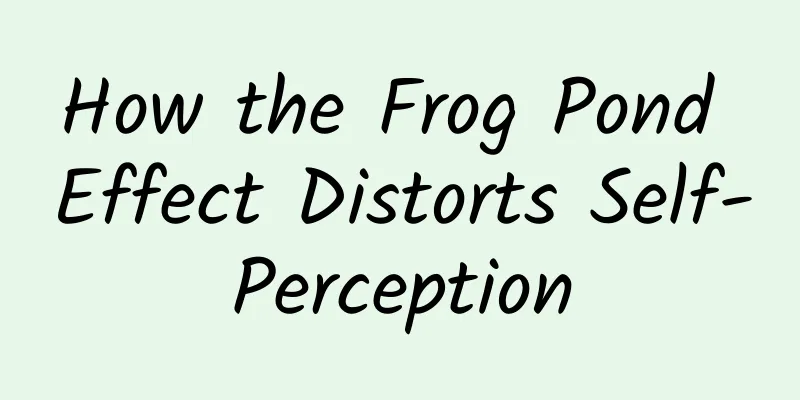How the Frog Pond Effect Distorts Self-Perception

|
Leviathan Press: Be a big frog in a small pond, or a small frog in a big pond? This seems to be an unanswerable question. In a sense, we are destined to be unable to get rid of the comparison with others around us. Although we know that some comparisons are meaningless, we cannot deny the positive significance brought by such comparisons. The pros and cons of this can only be experienced by each individual as an independent individual. Just like Wang Cailing in my previous article, she was outstanding in a small place, but she was just mediocre in a big city. Therefore, all aspects of social comparison must be analyzed in combination with specific issues. However, relatively objective self-cognition has never been an easy task: how many people do jobs they are not good at, and how many people are engaged in careers that they have no interest in at all. The judgment of self-ability, intelligence, and talent requires both comparison with the surrounding and the inner self-driving force. The balance of these two can only vary from person to person. In 2012, a study was published in the journal "Public Library of Science: Comprehensive" (PLOS One). The researchers invited a young woman to the laboratory of Ohio University. She learned that she was participating in an experiment in "aesthetic judgment." The researchers took a photo of her face and asked her to sit at a table with a computer monitor and a mirror. The woman was shown a monitor with facial images of what the study defines as "attractive professional models" -- all female. After her eyes were bombarded with these pretty faces, she saw a picture of herself appear on the screen. But there wasn't just one picture. She saw 13 pictures of herself spread out across the monitor. Upon closer inspection, she saw that each picture had a slightly different face. The researchers used a specially designed photo-editing program to distort her original photos in various ways - some to make her look better, others to make her look worse. In addition to the original photos, she was shown eight photos that had been enhanced - some quite significantly - and four that had been distorted. She was asked to use a mirror to choose the photo that represented her true self. Although the number of beautiful photos outnumbered the ugly ones (in a ratio of 2:1), she still chose the ugly photo as the true image she saw in the mirror. © journals.plos.org The researchers repeated the experiment with about 70 men and women. Each time, after seeing a large number of beautiful faces, the participants tended to choose the "fake" photos of themselves that were uglier. On the other hand, when the researchers switched the approach and asked them to look at ugly faces first, these people tended to choose the beautified photos of themselves. “This effect is magnified when we compare ourselves to our perceived peers.” Since the advent of social comparison theory in the early 1950s, psychologists and sociologists have produced a wealth of evidence that people’s perceptions of themselves—appearance, talents, intelligence, and achievements—are largely based on the traits of the people they identify with and associate with. When these comparisons lead to inaccurate self-representations or evaluations, the distortion is sometimes called the frog-pond effect. The phrase originated in a 1966 paper that noted that students with lower GPAs (grade point average, the standard measure of academic achievement in the United States) at selective colleges tended to view themselves as less academically competent than students with higher GPAs at lower-tier schools. "It is better to be a big frog in a small pond than a small frog in a big pond," the author wrote. Since then, the term "frog pond effect" has continued to appear in various studies. “We adopted this term to refer to the tendency for higher-status individuals in lower-status groups to rate themselves more highly, while lower-status individuals in higher-status groups tend to rate themselves less highly,” said Ethan Zell, PhD, associate professor of psychology at the University of North Carolina at Greensboro and an author of the PLOS ONE study. In other words, we use others as a reference when evaluating ourselves. Upward social comparison may make us think we are less attractive or competent; downward social comparison may have the opposite effect. "When we compare ourselves to what we perceive as our peers, this effect is amplified," Zell explained. Social comparison plays a large role in our lives, especially when we are young or vulnerable. Research has found that we all engage in social comparisons, consciously or unconsciously—dozens, if not hundreds, of times a day. In some way, these comparisons affect every aspect of our well-being and behavior: from our confidence to our self-esteem to our willingness to take risks to our likelihood of falling into anxiety or depression. Upward social comparison isn’t necessarily harmful. “It can motivate us to take better care of ourselves or be more proactive in positive ways,” Zell says. But like anything, it can backfire. Unfortunately, the social comparisons of modern life can overwhelm us, distorting our self-perception and undermining our happiness. In the context of social media, the “highlight moment” effect describes people’s tendency to only present their best, most glamorous version of themselves online. There is growing evidence that, especially among young people, the more time they spend viewing others’ embellished images, the more likely it is that the frog-pond effect and upward social comparison will affect their self-evaluations. Social media and technology actually expand the scope of social comparison, Zell said. Like his study subjects, who lowered their self-esteem after seeing beautiful faces, many of us can’t help but feel inferior when we see photos of people who appear to be cooler, more interesting, funnier, prettier or more fashionable than we are. Zell explains that when we surround ourselves with people we consider to be better than we actually are (even though objectively we are above average), we lose confidence and become demoralized. Social media influencers can have a particularly negative impact on our self-perceptions. We are likely to view these people as peers rather than as they actually are in real life—people with a little bit of fame. They are often well-rewarded for the image or lifestyle they project. We may learn about their painful past or insecurities, but the overall message our brain receives is, “This person is better than me.” “Stop dwelling on what we don’t have and instead appreciate what we do have, which may protect us from the negative effects of social comparison.” Before the advent of social media, most of the social comparisons we made were based on face-to-face interactions with real people in our social circles, such as friends, classmates, and colleagues. In these people who are more similar to ourselves, we see the good and the bad, that is, the advantages and disadvantages exist at the same time. This helps us calibrate our self-evaluation. Meanwhile, in our offline lives, we often hide our best qualities. Research has found that being compared to others can be offensive, so we adjust our behavior to better fit in with our peers. “We can sense when someone else is feeling bad, and because we’re better than them, we adjust. But on social media, it’s a different story,” Zell said. All of which is to say that reducing upward social comparison online could have all sorts of benefits. In the infinite pond that is the Internet, almost everyone will eventually feel like a frog. Furthermore, there is evidence that gratitude practice is an effective strategy for combating negative self-evaluations. Research has found that while social comparison often triggers feelings of deprivation and the negative emotions that come with it, a grateful attitude seems to have the opposite effect. “Not dwelling on what we don’t have and instead appreciating what we do have may protect us from the negative effects of social comparison,” wrote the authors of a 2019 study published in Frontiers in Psychology. Two approaches to gratitude practice seem to be particularly effective. First, write down what you’re grateful for in a journal. Focus on people and positive social interactions rather than personal achievements or possessions. A 2017 study in the Journal of Clinical Psychology suggests thinking back on your day and thinking about the people you’ve met, interacted with, and are grateful for. The study found that doing this three times a week significantly boosted happiness and had a positive impact. Second, take the time to tell the people in your life why you are grateful for them. "Expressing gratitude is very, very important because it helps us overcome our self-serving bias," says Robert Emmons, PhD, a professor of psychology at the University of California, San Diego and a leading researcher on gratitude. "Grateful people are aware of the kindness that others have shown them, and they don't keep quiet about it." We can’t completely turn off our social comparison tendencies. But with a little effort, we can calibrate them. By Markham Heid Translated by Yord Proofreading/Amanda Original article/elemental.medium.com/how-the-frog-pond-effect-distorts-your-self-image-f701a84ae1ec This article is based on the Creative Commons License (BY-NC) and is published by Yord on Leviathan The article only reflects the author's views and does not necessarily represent the position of Leviathan |
<<: Can the bladder really explode?
>>: Why do you buy the front trotters when buying pig's trotters?
Recommend
The best time to take Chinese medicine after childbirth
Key reminder: Postpartum recovery, in coordinatio...
Makes you fat, accelerates skin aging, and induces diabetes? You may have misunderstood carbohydrates...
Tuchong Creative What do you think carbohydrates ...
Healthy Life from Oil | What are the effects of excessive intake of edible oil on health?
Excessive intake of edible oil can lead to obesit...
Vaginal opening enlarged after childbirth
For women who give birth naturally, it is common ...
What happens if progesterone levels are high?
After becoming pregnant, women generally need to ...
Picture of small granules on labia
Under normal circumstances, small particles will ...
What are the symptoms of pregnancy in the first five days?
Generally speaking, pregnant women will not have ...
How to pass kidney stones, natural stone passing method
Kidney stones are a common urinary disease. Some ...
From psychopaths to 'everyday sadists': Why do humans harm harmless people?
© Digital Journal Leviathan Press: In terms of pr...
What should I do if I have stomachache?
Stomach pain is a common problem for many people....
What causes pain and itching below
If women have vulvar itching, they will be misera...
How many days will it take for the swelling of the labia majora to disappear after the blood disappears?
Generally speaking, it is common to have blood br...
Analysis of the causes of leucorrhea odor and itching
In most cases, vaginal discharge with an unpleasa...
Will abdominal pain be a symptom of early pregnancy?
Lower abdominal pain in early pregnancy is a refl...









